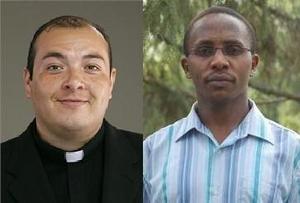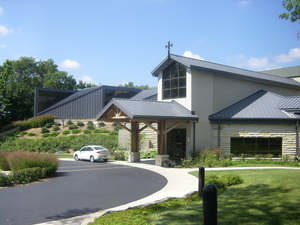 From my friend, Father Frowin, I learned of this tragic news:
From my friend, Father Frowin, I learned of this tragic news:Vocations: August 2011 Archives
 From my friend, Father Frowin, I learned of this tragic news:
From my friend, Father Frowin, I learned of this tragic news:"Please pray for the Diocese of Tulsa Sunday afternoon.
Last night a driver traveling an estimated 85 mph and failing to stop at a red
light broadsided and killed Father Jorge Gomez (ordained a priest just last month)
and seminarian Stanley Karioke."
Father Gomez was the new associate pastor at Saints Peter and Paul. He was a graduate of Saint Meinrad Seminary. Stanley was Kenyan born and working at the same parish as Father Jorge.
May their souls, and the souls of all the
faithful departed, rest in peace. Amen.
Here are the central paragraphs the Pope addressed to women religious at the Escorial earlier today.

Dear Sisters, every charism is an evangelical word which the Holy Spirit recalls to the Church's memory (cf. Jn 14:26). It is not by accident that consecrated life "is born from hearing the word of God and embracing the Gospel as its rule of life. A life devoted to following Christ in his chastity, poverty and obedience becomes a living 'exegesis' of God's word... Every charism and every rule springs from it and seeks to be an expression of it, thus opening up new pathways of Christian living marked by the radicalism of the Gospel" (Verbum Domini, 83).
Wednesday's edition of L'Osservatore Romano Pope Benedict's Wednesday General Audience where he reminded us that the monastic is an essential value for humanity and for the Church, today. The Pope's emphasis on beauty and silence to appreciate and to listen God's promptings of the desires of the heart is important. We ought to pay attention. Watch the Rome Reports news video.


The editor writes, "Monasteries are true and proper oases of the spirit in which God speaks to humanity. The Pope said this to faithful at the General Audience of Wednesday, 10 August, that was held in the courtyard of the Papal Residence at Castel Gandolfo."
Dear Brothers and Sisters! In every age, men and women who have consecrated their lives to God in prayer - like monks and nuns - have established their communities in particularly beautiful places: in the countryside, on hilltops, in valleys, on the shores of lakes or the sea, or even on little islands. These places unite two elements which are very important for contemplative life: the beauty of creation, which recalls that of the Creator, and silence, which is guaranteed by living far from cities and the great means of communication. Silence is the environmental condition that most favors contemplation, listening to God and meditation. The very fact of experiencing silence and allowing ourselves to be "filled," so to speak, with silence, disposes us to prayer. The great prophet, Elijah, on Mount Horeb - that is, Sinai - experienced strong winds, then an earthquake, and finally flashes of fire, but he did not recognize the voice of God in them; instead, he recognized it in a light breeze (cfr. 1 Rev 19:11-13). God speaks in silence, but we need to know how to listen. This is why monasteries are oases in which God speaks to humanity; and there we find the courtyard, a symbolic place because it is a closed space, but open toward the sky.

